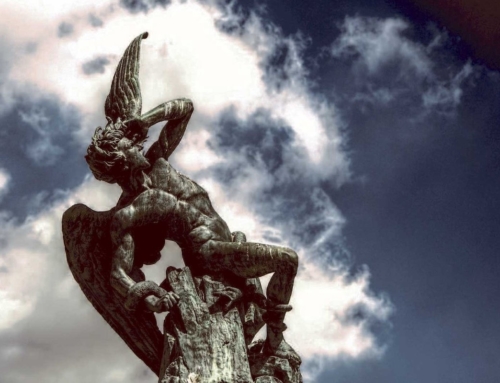I’ve been preparing for my next sermon series on the opening chapters of Genesis for a couple of months now. I usually start these things slowly, skimming books I’ve read before and reading through one or two of those books that present the different viewpoints on a particular issue (in this case the interpretation of Genesis 1-2). By now my mind is almost equally divided between the final weeks of 1 Peter and the Genesis series.
One issue that I’ve given a great deal of thought to – you might say the elephant in the room as it pertains to creation – is the simple fact that almost all non-Christians and many Christians are either doubtful about or outright deny the existence of two of the central characters of these chapters: Adam and Eve. I have yet to find arguments against the existence of an original human pair – their creation, placement in Eden, and fall into sin – convincing. That’s not because I’m a stick-in-the-mud or some sort of unthinking fundamentalist. Quite apart from one’s understanding of Genesis, I simply cannot escape the fact that Jesus himself and the Apostle Paul clearly believed in a historical Adam. Consider these statements by Christ and his Apostle:
Have you not read that he who created them from the beginning made them male and female…? (Matthew 19:4)
Therefore, just as sin came into the world through one man, and death through sin, and so death spread to all men… (Romans 5:12)
Yet death reigned from Adam to Moses, even over those whose sinning was not like the transgression of Adam, who was a type of the one who was to come. (Romans 5:14)
And the free gift is not like the result of that one man’s sin. For the judgment following one trespass brought condemnation, but the free gift following many trespasses brought justification. For if, because of one man’s trespass, death reigned through that one man, much more will those who receive the abundance of grace and the free gift of righteousness reign in life through the one man Jesus Christ. (Romans 5:16-17)
For as by the one man’s disobedience the many were made sinners, so by the one man’s obedience the many will be made righteous. (Romans 5:19)
For as by a man came death, by a man has come also the resurrection of the dead. For as in Adam all die, so also in Christ shall all be made alive. (1 Corinthians 15:21-22)
Thus it is written, “The first man Adam became a living being”; the last Adam became a life-giving spirit. (1 Corinthians 15:45)
The first man was from the earth, a man of dust; the second man is from heaven. As was the man of dust, so also are those who are of the dust, and as is the man of heaven, so also are those who are of heaven. Just as we have borne the image of the man of dust, we shall also bear the image of the man of heaven. (1 Corinthians 15:47-49)
For Adam was formed first, then Eve… (1 Timothy 2:13)
In all of these examples, Jesus and Paul assume that Adam and Eve were real historical persons. Adam was formed from the dust. Eve was formed after Adam. We are descended from Adam. Adam experienced a real fall into sin. We are born sinners because of Adam’s fall. Death reigns over us because of that fall. Imagine Paul’s response if we were to tell him that Adam never really existed. He’s just some literary figure meant to symbolize humanity. There was no original human pair; no fall in the garden; no actual sin on the part of our first parents. Imagine telling Jesus that there was no first married couple; no actual joining together of two people in one flesh in the garden. They’d reject such an assertion immediately, because more is at stake than merely our view of human origins. The origin of sin and death, God’s design for marriage, the representative, substitutionary work of Christ – all of these are tied to the belief that Adam and Eve were real historical persons.
Now, the moment we claim that we believe in a real Adam and Eve and in the Bible’s account of their creation and fall we are bound to be laughed at and mocked by those outside the faith (and even by some within the church). Let us remember one thing, though, while we endure such ridicule: the same naturalistic, materialistic view of the world that mocks belief in creation laughs at the idea of a virgin birth, supernatural healing, and the raising of the dead. If we allow ourselves to be blown about with the prevailing winds of science (which are bound to change as they always do) on this one thing (the existence of Adam and Eve) what is to stop us from denying the faith altogether.? Nothing. And many have done so from this very starting point.
So, as I prepare, I’m thinking a great deal about how much attention to give to such issues as the age of the earth, the theory of evolution, and the relationship of faith to science. I don’t want my attention drawn away from the text by these things, but neither do I want to ignore the very real questions and concerns of the people in the pews (or chairs, as it were). I will probably teach a class that deals with these issues in more detail while only touching on them briefly during my sermons. Feel free to offer more suggestions in the comments section on how I ought to approach these issues and pray for me as I continue to prepare for what’s ahead (both this Sunday and for the months to come!)




